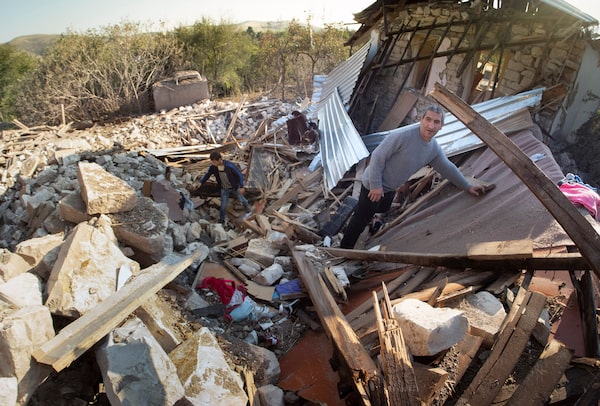
Garik Ovanisyan, right, climbs in a bomb crater at his house, which was destroyed by shelling by Azerbaijan's artillery in the town of Martuni, the separatist region of Nagorno-Karabakh, Wednesday, Oct. 14, 2020.The Associated Press
Christopher Waters is a professor of law at the University of Windsor. He has worked on human rights, armed conflict and rule-of-law issues in the South Caucasus for more than two decades.
For two deadly weeks, there has been war in Nagorno-Karabakh, a disputed region in the South Caucasus inhabited mostly by ethnic Armenians but recognized as de jure part of Azerbaijan. The fighting threatens to widen into the two countries, as a humanitarian ceasefire was widely ignored and missile strikes have begun outside the self-declared republic.
But despite the belief that conflict has been frozen after Armenians established control over the region in 1994, intense and deadly fighting has regularly flared up along the line of contact over the past quarter-century. In the early 2000s, when I was doing research in Nagorno-Karabakh, it was clear that this “border” region was a fully militarized and active theatre of conflict.
What is new is that civilians are being directly targeted, in violation of international humanitarian law. The tacit understanding between the parties – that the fighting would remain along the line of contact and between soldiers – is frayed, though to this point, there have been no attacks on the capital cities of Armenia or Azerbaijan proper. Azeri forces have systematically attacked Nagorno-Karabakh’s capital city of Stepanakert, and there has been an assault on a civilian area in Ganja. Further, enduring diplomatic and economic support for Azerbaijan from Turkey has spilled into more direct and active military support, including, bizarrely, the reported deployment of Syrian foreign fighters (Turkey has disputed this claim).
This conflict might seem easily solvable if only big powers would get out of the way, since this seems like a proxy war between Russia and Turkey. But that’s overly simplistic. Competing notions of ethnogenesis and civilization are firmly entrenched among the people on the ground, and so too is the belief among Armenians that Nagorno-Karabakh is and must remain independent from Azerbaijan.
This is not to say peace is unachievable. Ethnic Armenians and ethnic Azeris have lived together before; Ganja and the the Azeri capital of Baku were multiethnic cities, despite efforts by Azerbaijani President Ilham Aliyev’s government to now erase that history. In 1998 and again in 2001, the countries' leaders made progress, but balked in the face of concern over popular opposition to surrendering either lands or independence.
While most international lawyers would agree that Nagorno-Karabakh is formally part of Azerbaijan, and Azerbaijan defends its actions under a refrain of territorial integrity, Nagorno-Karabakh has created a state apparatus (with a healthy dose of absorption into the Armenian state) and effectively controls its own territory. Meanwhile, Armenians at home and abroad regularly cite the Kosovo precedent – correctly or not – in calling for self-determination and ultimately independence in the face of ethnic cleansing.
In light of this entrenched conflict, what can Canada do? Canada has quite properly suspended exports of a Canadian-made drone-targeting sensor to Turkey as it investigates allegations that the equipment has been used by Azeri forces. Foreign Affairs Minister François-Philippe Champagne has also now pressed Turkey to “stay out of the conflict.”
But Canada needs to do more than say the right things. We have no embassies in the South Caucasus; despite the large Armenian diaspora in Canada, our ties with that country are handled through our Moscow embassy, while the embassy in Ankara deals with Azerbaijan and Georgia relations. Little has been done to further economic, cultural or academic ties with the region, and Canadian diplomats often appear absent on South Caucasian issues – even tone-deaf, at times.
Canada should be actively supporting international efforts – including through the Organization for Security and Co-operation in Europe – to manage the conflict, especially as the United States has all but abandoned its global leadership role after co-chairing the Minsk peace process with Russia and France. Our government has a positive role to play in at least managing the conflict and ultimately searching for a durable, negotiated solution, as out of reach as that may seem at this moment. Actively engaging with the region, and not just when pressured to do so by the Armenian-Canadian community, would be a good start.
Keep your Opinions sharp and informed. Get the Opinion newsletter. Sign up today.